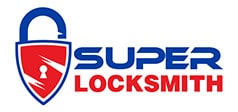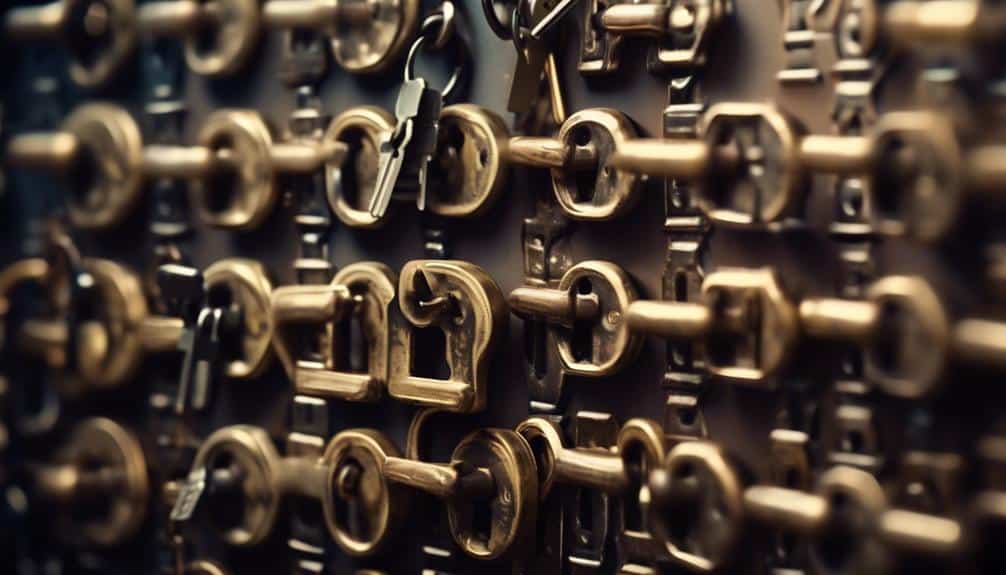When it comes to securing our offices, we often find ourselves in a delicate dance, like a locksmith navigating a labyrinth of possibilities. We strive to strike the perfect balance between convenience and safety, ensuring that authorized personnel can access the areas they need while keeping unauthorized individuals at bay.
In this discussion, we will explore the fascinating world of office master key systems, unveiling the secrets behind their effectiveness and discussing how they can maximize security in our workplaces.
So, join us as we unravel the intricacies of these systems and discover the key to fortifying our office spaces.
Benefits of Office Master Key Systems
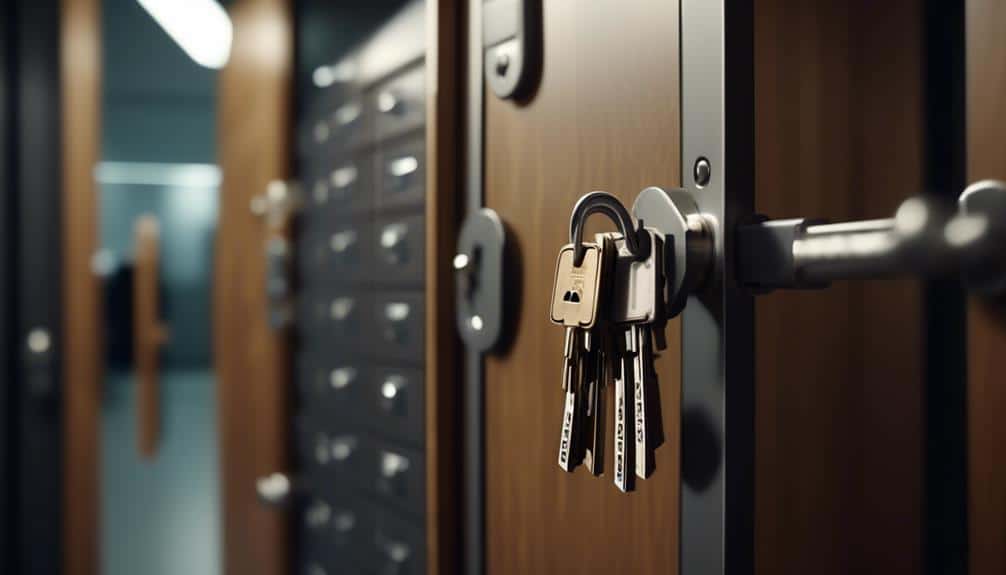
One of the key benefits of office master key systems is the ability to grant access to multiple areas with a single key. This advantage eliminates the need for employees or authorized personnel to carry a bulky keychain with multiple keys for different areas. With an office master key system, individuals can conveniently access various rooms or spaces without the hassle of sorting through numerous keys.
Implementing office master key systems does come with its own set of challenges. One of the main implementation challenges is ensuring proper security measures are in place to prevent unauthorized access. It's crucial to establish strict key control protocols, such as limiting the number of individuals who've access to the master key. Additionally, maintaining accurate records and conducting regular audits of the key system are necessary to prevent any potential security breaches.
Despite these implementation challenges, the advantages of office master key systems outweigh the difficulties. In addition to the convenience of carrying a single key, these systems enhance security by allowing quick access to authorized personnel while still maintaining control over who can enter specific areas. By carefully addressing the implementation challenges, businesses can maximize the benefits of office master key systems and ensure a secure and efficient access control system.
How Office Master Key Systems Work
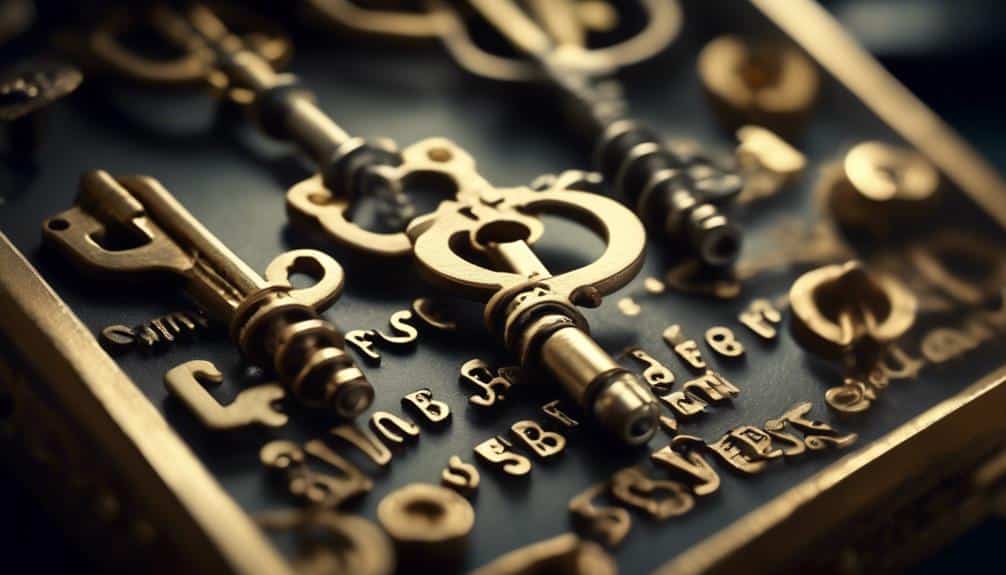
Let's now explore how office master key systems work.
One important aspect is the key hierarchy and access, which determines who can access certain areas within the office.
Additionally, the lock rekeying process allows for easy changes to the system when needed.
Lastly, office master key systems often come with enhanced security features to provide an extra layer of protection.
Key Hierarchy and Access
To understand how office master key systems work, it's important to grasp the concept of key hierarchy and access within these systems.
Key hierarchy refers to the organization of keys within the system. At the top of the hierarchy is the master key, which grants access to all locks in the system. Below the master key are sub-master keys, which provide access to specific groups of locks. Finally, there are individual keys that only open one specific lock.
Access within the system is managed by system administrators. They have the authority to issue keys to authorized personnel and control access levels. By carefully managing key distribution and access permissions, system administrators can prevent unauthorized access and maintain a high level of security.
Understanding key hierarchy and access is crucial for effectively implementing and managing an office master key system. It allows for better control over who can access certain areas and ensures that the system remains secure.
Lock Rekeying Process
The lock rekeying process is a crucial aspect of how office master key systems work, allowing for the modification of lock cylinders to match a new set of keys while preserving the existing hardware. Lock maintenance is essential to ensure the proper functioning and security of these systems.
When the need arises to change the key access, lock rekeying provides a cost-effective solution. This process involves disassembling the lock cylinder, removing the existing pins, and replacing them with new ones that correspond to the new set of keys. Key reprogramming is then necessary to ensure that the new keys align with the modified lock cylinders.
Enhanced Security Features
Enhanced security features are a fundamental aspect of how office master key systems operate, providing businesses with advanced protection and control over access to their premises. These systems offer robust access control mechanisms that allow administrators to easily manage and monitor who can enter specific areas within the office.
One of the key security features is the use of restricted keys. These keys are specially designed to prevent unauthorized duplication, ensuring that only authorized personnel can make copies. Restricted keys also incorporate advanced technology, such as patented keyways and unique key codes, making them extremely difficult to pick or manipulate.
Furthermore, office master key systems often include additional security measures like high-security locks and cylinders, which provide added resistance against picking, drilling, and other tampering techniques.
With these enhanced security features, businesses can have peace of mind knowing that their premises are well-protected against unauthorized access.
Types of Locks Compatible With Master Key Systems
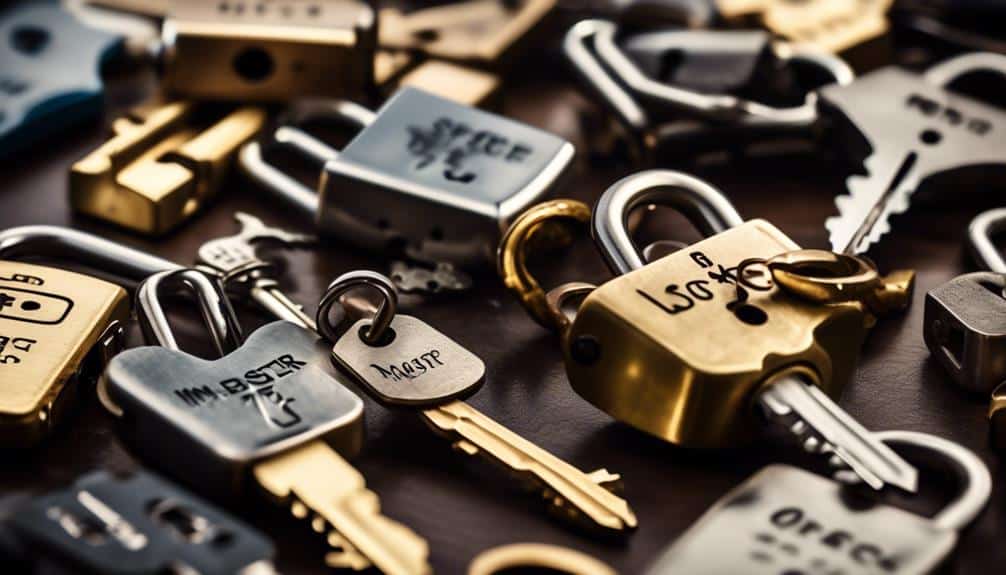
Various types of locks can be seamlessly integrated into master key systems, allowing for efficient access control and enhanced security. When choosing locks for a master key system, it's important to consider the specific needs and requirements of the facility.
Here are three types of lock cylinders that are commonly compatible with master key systems:
- Pin Tumbler Cylinders: These cylinders are widely used in commercial and residential settings due to their simplicity and reliability. They consist of a series of pins that align when the correct key is inserted, allowing the lock to be turned.
- Disc Detainer Cylinders: These cylinders offer a higher level of security compared to pin tumbler cylinders. They use a series of rotating discs with notches that must align to allow the lock to open. Disc detainer cylinders are resistant to picking and manipulation.
- Tubular Lock Cylinders: These cylinders are commonly found in vending machines, gaming machines, and other small applications. They use a circular key with pins that correspond to the notches on the inner part of the lock cylinder.
In addition to selecting the appropriate lock cylinders, implementing key control measures is crucial for maintaining the security of a master key system. This includes practices such as issuing keys only to authorized personnel, keeping a record of key holders, and regularly auditing the system to identify any potential security breaches.
Choosing the Right Master Key System for Your Office
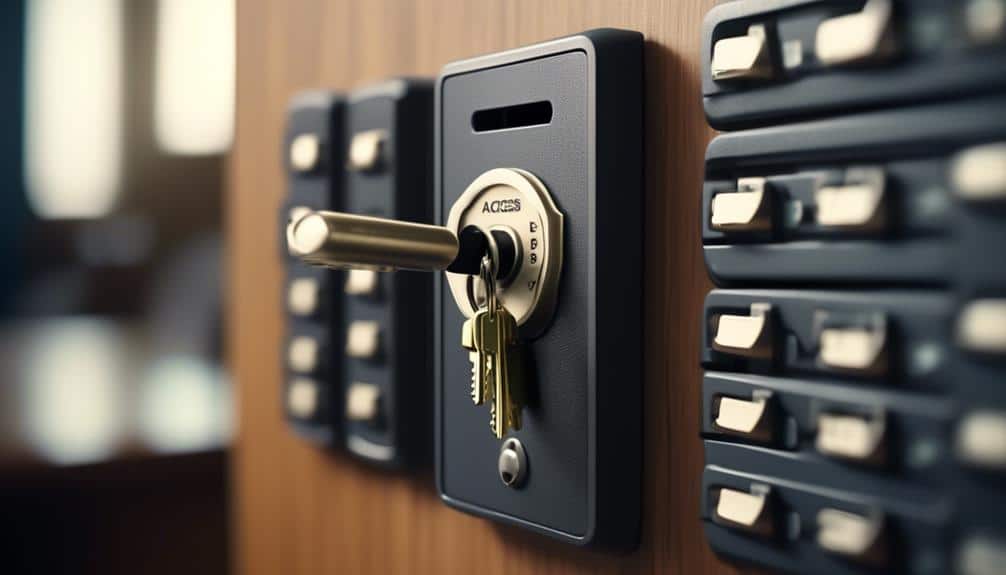
When choosing the right master key system for our office, there are two key points to consider: key system compatibility and security level assessment.
We need to ensure that the master key system is compatible with the locks we have in place to avoid any issues or additional costs.
Additionally, conducting a thorough security level assessment will help us determine the level of security required for our office and choose a master key system that meets those needs.
Key System Compatibility
To ensure optimal security and efficiency in your office, selecting the appropriate master key system is paramount. When considering key system compatibility, there are several factors to keep in mind:
- Key System Maintenance: A compatible master key system should be easy to maintain and require minimal effort for regular upkeep. Look for systems that offer simple key management and allow for easy rekeying or replacement of keys when needed.
- Key System Expansion: As your office grows and evolves, it's important to choose a master key system that can accommodate future expansion. Ensure that the system is scalable and can easily incorporate additional locks or access points without compromising security or efficiency.
- Compatibility with Existing Hardware: Before implementing a master key system, it's crucial to assess the compatibility of the system with your existing locks and hardware. Ensure that the system can seamlessly integrate with your current infrastructure, avoiding the need for costly replacements or modifications.
Security Level Assessment
After considering key system compatibility, the next step in choosing the right master key system for your office is to assess the security level required.
Security level assessment is crucial as it helps determine the level of protection needed for your office premises and assets. This assessment involves evaluating the potential risks and threats your office may face, such as unauthorized access or theft, and identifying the appropriate measures to mitigate these risks.
Key system compatibility plays a vital role in this assessment since it ensures that the master key system you choose aligns with your security requirements. By accurately assessing the security level required, you can select a master key system that provides the necessary level of protection while also being compatible with your existing key systems.
Key Management Best Practices for Office Master Key Systems
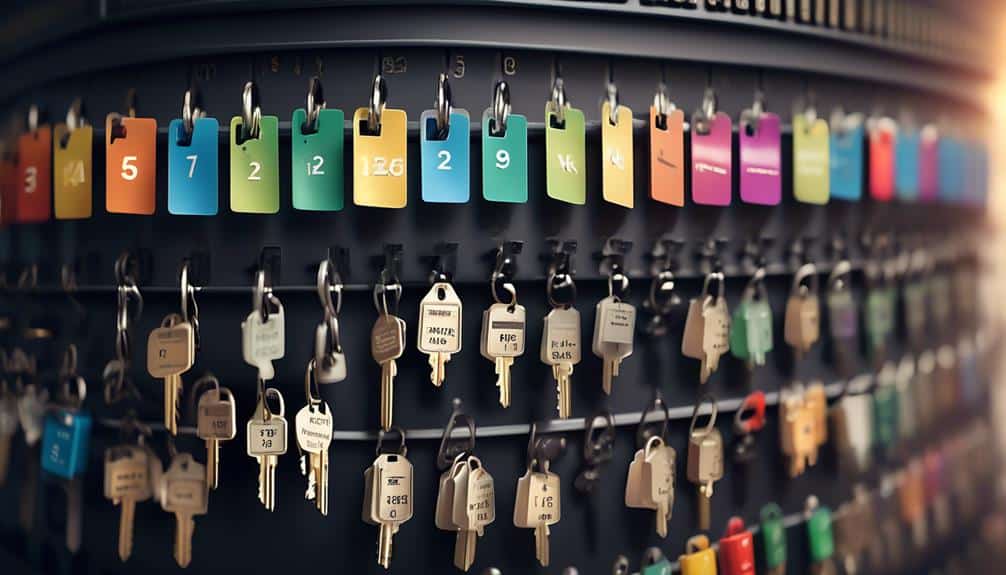
Implementing effective key management practices is crucial for maintaining security and efficient operations within office master key systems. To ensure smooth functioning and optimal security, it's essential to follow these key management best practices:
- Utilize key management software:
- Implementing a reliable key management software can streamline the process of tracking and managing keys.
- This software enables administrators to easily assign and track key access, maintain an audit trail, and generate reports on key usage.
- Establish key control procedures:
- Implementing strict key control procedures is vital to prevent unauthorized access and maintain the integrity of the key system.
- This includes keeping a record of all key holders, regularly auditing and reissuing keys, and conducting periodic reviews of access privileges.
- Implement a secure key storage system:
- It's crucial to have a secure and controlled environment for storing keys.
- This can include using secure key cabinets or safes that require authorized access, implementing key check-in and check-out procedures, and ensuring keys are returned promptly after use.
Enhancing Security With Restricted Keys
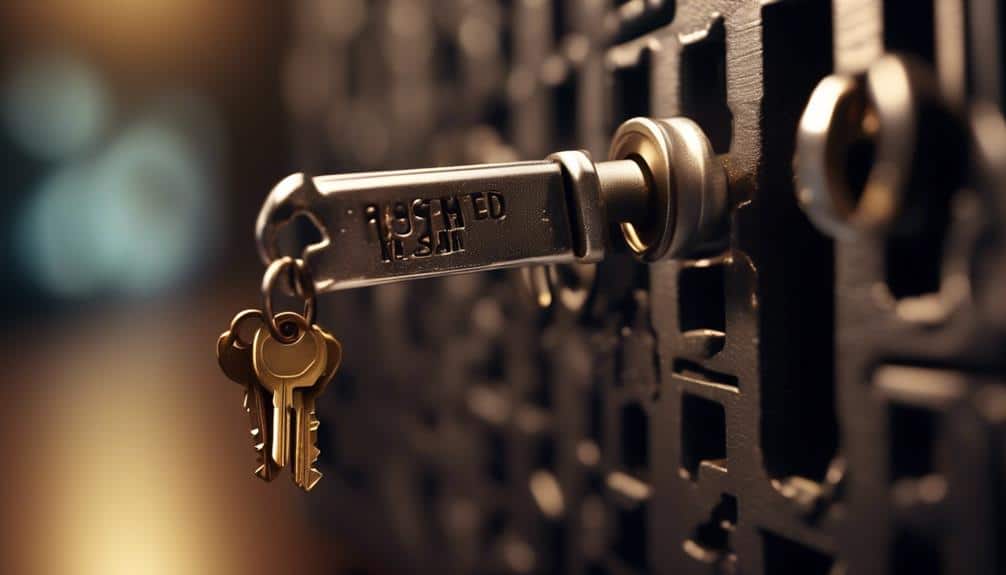
Enhancing security within office master key systems can be achieved through the use of restricted keys. Restricted keys offer several benefits that contribute to a higher level of security. First and foremost, these keys are designed to be difficult to duplicate, ensuring that only authorized individuals can obtain copies. This prevents unauthorized access to sensitive areas and reduces the risk of key misuse or duplication. Additionally, restricted keys often come with features such as patent protection and key control systems, which further enhance their security.
Implementing restricted keys effectively requires careful consideration. Firstly, it's crucial to work with a trusted locksmith who specializes in restricted key systems. They can provide expert advice on the best key profiles and technologies to suit your specific security needs.
Secondly, it's important to establish a clear and comprehensive key control policy. This policy should outline procedures for issuing, tracking, and returning restricted keys, as well as guidelines for keyholders to follow. Regular audits and inspections should also be conducted to ensure compliance with the key control policy.
Implementing Multi-Level Access Control With Master Key Systems
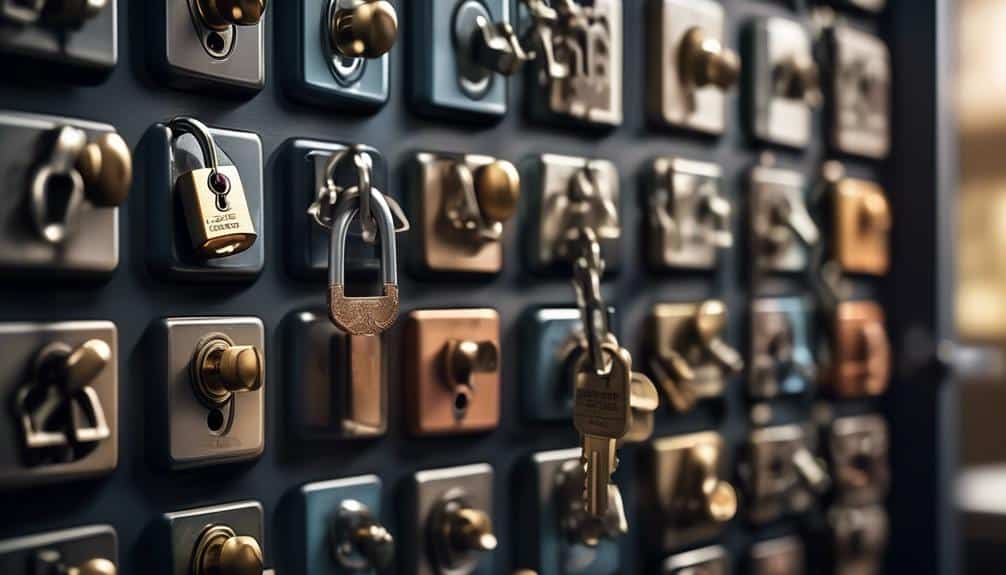
To establish a comprehensive multi-level access control system, careful consideration must be given to the implementation of master key systems. These systems play a crucial role in ensuring the security of an office or building by allowing authorized individuals to access different areas based on their level of clearance.
Here are three key points to keep in mind when implementing multi-level access control with master key systems:
- Designing a hierarchy: A successful multi-level security implementation begins with designing a clear hierarchy of access levels. This involves categorizing different areas or zones based on their sensitivity and assigning appropriate access permissions to individuals or groups.
- Key control management: Effective key control management is essential for maintaining the integrity of the system. This includes keeping a record of all issued keys, ensuring keys are returned when no longer needed, and promptly rekeying locks when necessary.
- Regular audits and updates: Regular audits should be conducted to ensure that the access control system is functioning properly and that all keys are accounted for. Additionally, as the security needs of an organization evolve, it's important to regularly update the master key system to reflect any changes in access requirements.
Common Mistakes to Avoid When Using Office Master Key Systems
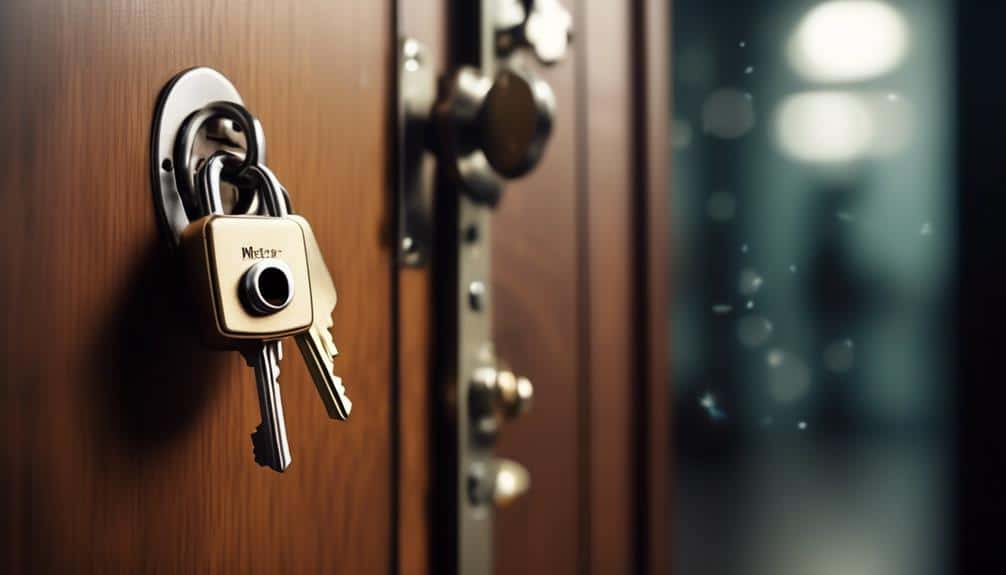
When using office master key systems, it's crucial to avoid common mistakes that can compromise security.
One such mistake is the risk of key duplication, which can occur if keys aren't properly controlled and monitored.
Additionally, the lack of proper documentation, such as key logs and records, can lead to confusion and difficulties in managing the system effectively.
Key Duplication Risks
We can enhance the security of office master key systems by avoiding common mistakes when duplicating keys. Key duplication risks can compromise the integrity of the entire system, making it vulnerable to unauthorized access.
To mitigate key duplication risks, it's crucial to follow these best practices:
- Restrict key duplication: Limit access to key duplication services and ensure that only authorized personnel can request key copies. This helps prevent unauthorized individuals from obtaining duplicate keys.
- Use restricted keyways: Choose high-security keyways that aren't easily duplicated. These keyways have complex designs and require specialized equipment to duplicate, making it difficult for unauthorized individuals to create copies.
- Implement key control policies: Establish strict procedures for issuing, tracking, and returning keys. Ensure that keys are accounted for at all times and that any lost or stolen keys are promptly reported and replaced.
Lack of Proper Documentation
In order to maintain the security and integrity of office master key systems, it is imperative to ensure proper documentation is in place, avoiding the common mistake of lacking comprehensive records. Proper documentation plays a crucial role in key management challenges, as it provides a clear and organized record of key distribution, usage, and access. Without such documentation, the system becomes vulnerable to unauthorized key duplication and misuse. To illustrate the importance of proper documentation, consider the following table:
| Key Number | Key Holder | Date Issued | Date Returned |
|---|---|---|---|
| 001 | John Smith | 2021-05-01 | 2021-06-15 |
| 002 | Jane Doe | 2021-06-05 | – |
| 003 | Mark Brown | 2021-06-10 | – |
| 004 | Sarah Green | 2021-06-15 | – |
This table provides a snapshot of key distribution, allowing for easy tracking of who has which key and when it was issued or returned. By maintaining comprehensive records like these, organizations can mitigate the risk of unauthorized key access and ensure the security of their office master key systems.
Maintenance and Troubleshooting Tips for Master Key Systems

To effectively maintain and troubleshoot master key systems, it's crucial to adhere to a technical and precise approach, ensuring clarity and precision throughout the process. Here are some maintenance tips and troubleshooting techniques to help you keep your master key system running smoothly:
- Regular Lubrication: Apply a high-quality graphite lubricant to all moving parts, such as keyways and cylinders, to reduce friction and prevent sticking. Avoid using oil-based lubricants as they can attract dust and dirt, causing the system to jam.
- Key Inspection: Regularly inspect keys for signs of wear and tear, such as bent or damaged teeth. Replace any compromised keys promptly to prevent them from causing issues in the system.
- Periodic Rekeying: Consider rekeying the system periodically to maintain its security. This involves changing the combination of the master key and its subordinate keys while keeping the hardware intact.
When troubleshooting a master key system, start by identifying the specific issue and its root cause. Whether it's a key that doesn't turn smoothly or a lock that fails to open, analyze the problem carefully before taking any action. In some cases, a simple adjustment or cleaning may solve the issue, while more complex problems may require the assistance of a professional locksmith. Remember to document any changes made to the system for future reference.
Future Trends in Office Master Key System Technology
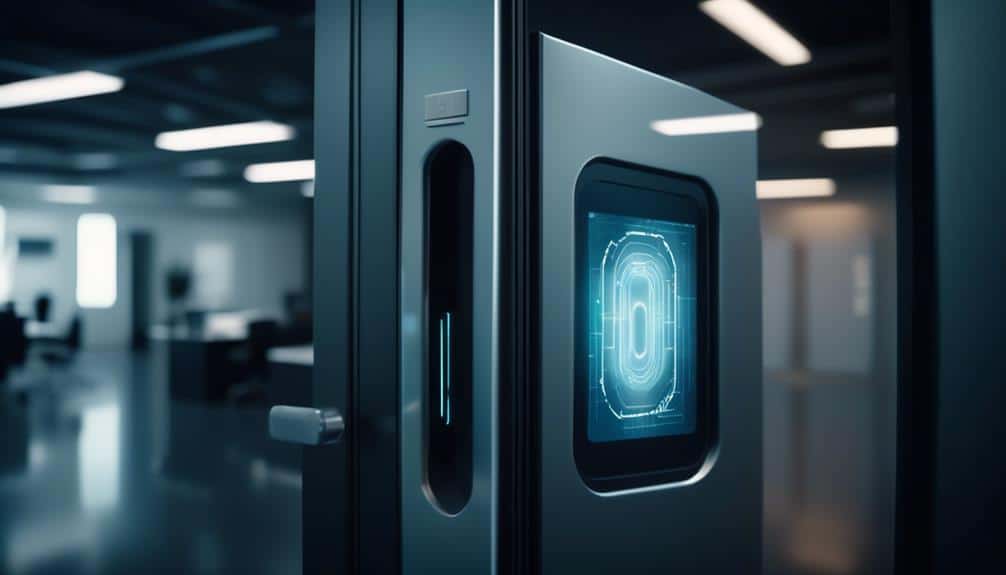
The future of office master key system technology holds promising advancements in security, efficiency, and convenience. As technology continues to evolve, master key systems are also expected to undergo significant improvements. One of the key future advancements in office master key systems is the integration with smart technology. This integration will allow for seamless control and management of access to different areas within an office building.
With the integration of smart technology, office master key systems will become more efficient and convenient. Employees will be able to access different areas of the office using their smartphones or other smart devices, eliminating the need for physical keys or access cards. This not only streamlines the access process but also enhances security by providing an audit trail of who accessed which areas and at what times.
Additionally, the integration with smart technology will enable remote access control. This means that office managers or security personnel can remotely grant or revoke access to specific areas, even when they are not physically present at the office. This level of flexibility and control enhances security and allows for more efficient management of access rights.
In conclusion, the future of office master key system technology is set to bring about exciting advancements in security, efficiency, and convenience. The integration with smart technology will revolutionize the way access is managed within office buildings, offering a seamless and secure solution for controlling access to different areas.
| Advancements | Integration with Smart Technology |
|---|---|
| Increased Security | Access control through smartphones |
| Enhanced Efficiency | Streamlined access process |
| Improved Convenience | Remote access control |
Frequently Asked Questions
Are Office Master Key Systems Compatible With Electronic Locks and Access Control Systems?
Yes, office master key systems are compatible with electronic locks and access control systems.
However, there are both pros and cons to consider.
The advantages include increased security, convenience, and flexibility in managing access. Electronic locks and access control systems can enhance the overall effectiveness of an office master key system.
On the other hand, some disadvantages may include higher costs, potential technological issues, and the need for additional training and maintenance.
Careful evaluation is necessary to determine if this compatibility is suitable for your specific security needs.
Can Office Master Key Systems Be Used in Large Multi-Story Office Buildings?
Office master key systems can be advantageous in large multi-story office buildings. They provide a convenient solution for managing access to multiple areas, reducing the need for numerous keys.
However, implementing these systems in such buildings requires careful consideration. Factors like the number of floors, the complexity of the building layout, and the specific security requirements must be taken into account.
It's essential to consult with professionals to ensure that the office master key system meets the building's unique needs and maximizes security.
How Long Does It Typically Take to Install an Office Master Key System?
On average, it takes a reasonable amount of time to install an office master key system. The installation process involves carefully planning and coordinating with our team of experts. We ensure that each lock is properly aligned and functioning smoothly.
The benefits of office master key systems are numerous, including enhanced security, convenience, and efficient access control. Our installation process is designed to minimize disruptions to your business operations while maximizing the security of your office space.
Is It Possible to Upgrade an Existing Lock System to an Office Master Key System?
Yes, it's possible to upgrade an existing lock system to an office master key system. By doing so, you can enhance the security of your office space.
Upgrading to an office master key system offers several benefits, such as increased control over access, convenience, and ease of key management.
With this system, you can assign different levels of access to different individuals, ensuring that only authorized personnel can enter specific areas.
This upgrade can significantly improve the overall security of your office.
Are There Any Legal or Regulatory Requirements to Consider When Implementing an Office Master Key System?
When implementing an office master key system, it's crucial to consider the legal requirements and regulatory considerations. These factors ensure that the system is in compliance with applicable laws and regulations.
Legal requirements may include obtaining permits or licenses, adhering to building codes, and protecting the privacy of individuals.
Regulatory considerations may involve meeting specific industry standards, implementing proper security measures, and maintaining records for auditing purposes.
